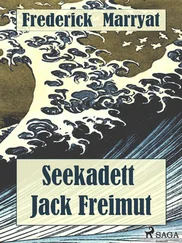Frederick Marryat - The King's Own
Здесь есть возможность читать онлайн «Frederick Marryat - The King's Own» — ознакомительный отрывок электронной книги совершенно бесплатно, а после прочтения отрывка купить полную версию. В некоторых случаях можно слушать аудио, скачать через торрент в формате fb2 и присутствует краткое содержание. Год выпуска: 0101, Издательство: Array Иностранный паблик, Жанр: foreign_antique, foreign_prose, на английском языке. Описание произведения, (предисловие) а так же отзывы посетителей доступны на портале библиотеки ЛибКат.
- Название:The King's Own
- Автор:
- Издательство:Array Иностранный паблик
- Жанр:
- Год:0101
- ISBN:нет данных
- Рейтинг книги:4 / 5. Голосов: 1
-
Избранное:Добавить в избранное
- Отзывы:
-
Ваша оценка:
- 80
- 1
- 2
- 3
- 4
- 5
The King's Own: краткое содержание, описание и аннотация
Предлагаем к чтению аннотацию, описание, краткое содержание или предисловие (зависит от того, что написал сам автор книги «The King's Own»). Если вы не нашли необходимую информацию о книге — напишите в комментариях, мы постараемся отыскать её.
The King's Own — читать онлайн ознакомительный отрывок
Ниже представлен текст книги, разбитый по страницам. Система сохранения места последней прочитанной страницы, позволяет с удобством читать онлайн бесплатно книгу «The King's Own», без необходимости каждый раз заново искать на чём Вы остановились. Поставьте закладку, и сможете в любой момент перейти на страницу, на которой закончили чтение.
Интервал:
Закладка:
“We must now submit to their terms, sir,” said the first lieutenant.
“Any terms, any terms,” answered the terrified captain: “tell them so, for God’s sake, or they will fire. Adams, go forward and tell them we submit.”
This order was, however, unnecessary; for the mutineers, aware of the impossibility of any further resistance, had thrown down the barricade of hammocks, and, with Peters at their head, were coming aft.
“You consent, gentlemen, to consider yourselves under an arrest?” inquired Peters of the first lieutenant and officers, without paying any attention to the captain.
“We do, we do,” cried Captain A — . “I hope you will not stain your hands with blood. Mr Peters, I meant the child no harm.”
“If you had murdered him, Captain A — , you could not have injured him so much as you have injured his father,” retorted Peters; “but fear not for your life, sir: that is safe; and you will meet all the respect and attention to your wants that circumstances will permit. We war not with individuals.”
It was a proud moment for Peters to see this man cringing before him, and receiving with thanks the promise of his life from one whom he had so cruelly treated. There was a glorious revenge in it, the full force of which could only be felt by the granting, not the receiving party: for it could only be appreciated by one who possessed those fine and honourable feelings, of which Captain A — was wholly destitute.
If the reader will consult the various records of the times which we are now describing, he will find that every respect was personally paid to the officers, although they were deprived of their arms. Some of the most obnoxious were sent on shore, and the intemperate conduct of others produced effects for which they had only to thank themselves; but, on the whole, the remark made by Peters was strictly correct: “They warred not with individuals,” — they demanded justice from an ungrateful country.
It is true that the demands in this mutiny were not so reasonable as in the preceding; but where is the man who can confine himself to the exact balance of justice when his own feelings are unwittingly thrown into the scale?
As I before stated, it is not my intention to follow up the details of this national disgrace, but merely to confine myself to that part which is connected with the present history. Peters, as delegate from his ship, met the others, who were daily assembled, by Parker’s directions, on board of the Queen Charlotte, and took a leading and decided part in the arrangements of the disaffected fleet.
But Parker, the ringleader, although a man of talent, was not equal to the task he had undertaken. He lost sight of several important features necessary to insure success in all civil commotions: such as rapidity and decision of action, constant employment being found, and continual excitement being kept up amongst his followers, to afford no time for reflection. Those who serve under an established government know exactly their present weight in the scale of worldly rank, and the extent of their future expectations; they have accustomed themselves to bound their ambition accordingly: and feeling conscious that passive obedience is the surest road to advancement, are led quietly, here or there, to be slaughtered at the will and caprice of their superiors. But the leader of the disaffected against an established government has a difficult task. He has nothing to offer to his followers but promises. There is nothing on hand — all is expectation. If allowed time for reflection, they soon perceive that they are acting an humble part in a dangerous game; and that even though it be attended with success, in all probability they will receive no share of the advantages, although certain of incurring a large proportion of the risk. The leader of a connected force of the above description rises to a dangerous height when borne up by the excitement of the time; but let it once be permitted to subside, and, like the aeronaut in his balloon, from which the gas escapes while it is soaring in the clouds, he is precipitated from his lofty station, and gravitates to his own destruction.
He must be a wonderful man who can collect all the resources of a popular commotion, and bring it to a successful issue. The reason is obvious — everything depends upon the leader alone. His followers are but as the stones composing the arch of the bridge by which the gulf is to be crossed between them and their nominal superiors; he is the keystone, upon which the whole depends — if completely fitted, rendering the arch durable and capable of bearing any pressure; but if too small in dimensions, or imperfect in conformation, rendering the whole labour futile, and occasioning all the fabric previously raised to be precipitated by its own weight, and dispersed in ruin and confusion.
This latter was the fate of the mutiny at the Nore. The insurrection was quelled, and the ringleaders were doomed to undergo the utmost penalty of martial law. Among the rest, Peters was sentenced to death.
In the foremost part of the main-deck of a line-of-battle ship, in a square room, strongly bulk-headed, and receiving light from one of the ports, as firmly secured with an iron grating — with no other furniture than a long wooden form — his legs in shackles, that ran upon a heavy iron bar lying on the deck — sat the unfortunate prisoner, in company with three other individuals — his wife, his child, and old Adams, the quartermaster. Peters was seated on the deck, supporting himself by leaning against the bulkhead. His wife was lying beside him, with her face hidden in his lap. Adams occupied the form, and the child stood between his knees. All were silent, and the eyes of the three were directed towards one of the sad company, who appeared more wretched and disconsolate than the rest.
“My dear, dear Ellen!” said Peters, mournfully, as a fresh burst of grief convulsed her attenuated frame.
“Why, then, refuse my solicitations, Edward? If not for yourself, listen to me for the sake of your wife and child. Irritated as your father still may be, his dormant affection will be awakened, when he is acquainted with the dreadful situation of his only son; nay, his family pride will never permit that you should perish by so ignominious a death; and your assumed name will enable him, without blushing, to exert his interest, and obtain your reprieve.”
“Do not put me to the pain of again refusing you, my dearest Ellen. I desire to die, and my fate must be a warning to others. When I reflect what dreadful consequences might have ensued to the country from our rebellious proceedings, I am thankful, truly thankful, to God, that we did not succeed. I know what you would urge — my wrongs, my undeserved stripes. I, too, would urge them; and when my conscience has pressed me hard, have urged them in palliation; but I feel that it is only in palliation, not in justification, that they can be brought forward. They are no more in comparison with my crime than the happiness of one individual is to that of the nation which I assisted to endanger, because one constituting a part of it had, unauthorised, oppressed me. No, no, Ellen, I should not be happy if I were not to atone for my faults; and this wretched life is the only atonement I can offer. But for you, and that poor child, my dearest and kindest, I should go to the scaffold rejoicing; but the thoughts — O God, strengthen and support me!” cried the unhappy man, hiding his face in his hands.
“Fear not for me, Edward. I feel here,” said Ellen, laying her hand on her heart, “a conviction that we shall soon meet again. I will urge you no more love. But the boy — the boy — Oh, Edward! what will become of that dear boy when we are both gone?”
“Please God to spare my life, he’ll never want a father,” said old Adams, as the tears found a devious passage down the furrows of his weather-beaten face.
Читать дальшеИнтервал:
Закладка:
Похожие книги на «The King's Own»
Представляем Вашему вниманию похожие книги на «The King's Own» списком для выбора. Мы отобрали схожую по названию и смыслу литературу в надежде предоставить читателям больше вариантов отыскать новые, интересные, ещё непрочитанные произведения.
Обсуждение, отзывы о книге «The King's Own» и просто собственные мнения читателей. Оставьте ваши комментарии, напишите, что Вы думаете о произведении, его смысле или главных героях. Укажите что конкретно понравилось, а что нет, и почему Вы так считаете.












